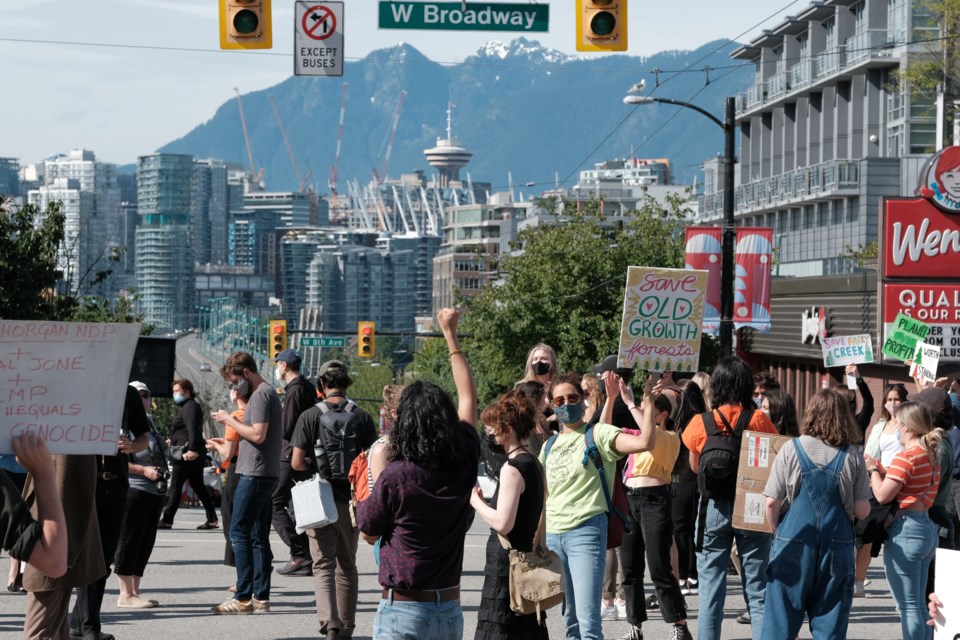BC’s war in the woods over old growth has bled out onto the streets, with protesters now resorting to blocking highways.
The most recent disruption occurred April 20, after two protesters chained themselves to a large barrel in the middle of the Trans Canada Highway near Goldstream Park in Greater Victoria.
The action ground traffic to a halt during rush hour, as it’s the only road out of Victoria to the rest of the Island and a busy commuter thoroughfare.
Just a couple of weeks prior, the same group shut down two of downtown Victoria’s busiest streets with a protest.
And around the same time, organizers blocked three lanes of Highway 1 traffic in Metro Vancouver, creating massive gridlock – the latest in a series of actions on highways and bridges in the Lower Mainland that included a disruption on Easter Monday in which an activist glued her hand to the pavement.
“I truly sympathize with anyone who is delayed on the way to see their loved ones but one of the largest on-land carbon sinks must be preserved if we want any chance of having a planet that can grow food in the next few decades,” organizer Ian Weber told Black Press after one of the Island protests.
The group, Save Old Growth, is not the same one that was leading the months-long protests against old growth logging at Fairy Creek, which captured international attention.
But the Fairy Creek action appears to have mostly sputtered out, after logging company Teal Jones won a decision at BC’s Court of Appeal to reinstate an injunction against environmental protesters there.
Unable to get government’s attention by losing in the courts, some activists have splintered off and turned to the highway disruptions instead.
But the province appeared ready.
It seized vehicles associated with one Vancouver protest under the Civil Forfeiture Act, leaving the protesters without wheels.
There’s a legitimate legal debate about whether the Civil Forfeiture Act, which is supposed to target organized crime and the proceeds of crime, is a fair or appropriate mechanism to target environmental protesters. That’s a slippery slope, and no doubt it will end up in some sort of court challenge.
But the protesters are deluding themselves if they think blocking highways, and stranding innocent motorists for hours, will help them win over any public support.
Nor are they going to get the ear of the BC government with the tactic.
Premier John Horgan has long tuned out the extreme elements of the environmental movement, and hasn’t suffered any voter blowback for doing so. He’s content to play hardball instead, perhaps hoping the environmentalists can convince the BC Greens to endorse their tactics and further push that party out of the mainstream sentiment. So far, the Greens haven’t taken the bait.
In the meantime, the government is making slow progress on old growth deferrals.
Forests Minister Katrine Conroy announced earlier this month BC had come to agreements with First Nations to temporarily defer 1.05 million hectares of old growth – roughly 40 per cent of the 2.6 million hectares that experts earmarked for preservation almost six months ago.
How far it gets down this path is an open question. But even if the government were to save a majority of the identified forests it wouldn’t be good enough for the protesters, who have a much more militant view about protecting all old growth trees from harvest, whether First Nations want to log them on their traditional territory or not.
The old growth file is a complex one for the Horgan government, as it seeks to balance the forestry job losses in rural Vancouver Island NDP ridings caused by deferrals, with the pressure from urban voters to at least try to preserve some of the province’s oldest trees from being logged.
Protesters might think they’re influencing government’s actions by jamming up traffic with their protests, but they are not. The BC NDP government has bigger concerns than catering to fringe environmental extremists who block traffic.
Rob Shaw has spent more than 13 years covering BC politics, now reporting for CHEK News and writing for The Orca. He is the co-author of the national best-selling book A Matter of Confidence, and a regular guest on CBC Radio.



